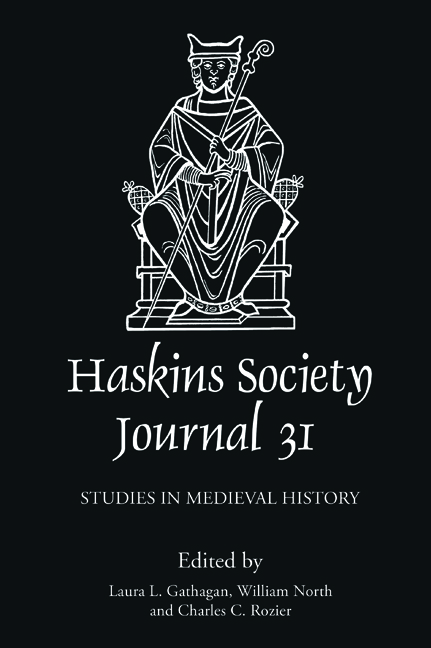Book contents
- Frontmatter
- Contents
- Figures and Tables
- Editors’ Note
- Abbreviations
- 1 Social Mobility and Manumissions in Early Medieval England
- 2 Flemish Settlements beyond Flanders: A Review and New Perspectives on Transregional Medieval Settlement Landscapes in Britain
- 3 The Road to Babylon: The First Crusade as Moral Performance
- 4 ‘Normans’ on the First Crusade: Actions and agendas of Two Crusaders: Robert Curthose and Bohemond of Taranto
- 5 The War Memoirs of Geoffroy of Villehardouin
- 6 Women in the Principality of Antioch: Power, Status, and Social Agency
- 7 The Story of the Veil: Matilda of Scotland, Controversy, and Imagination in Anglo-Norman Historiography
- 8 Political Identity and the Succession of Henry II
- 9 Competing Visions of the Past: Norman Identities in the Thirteenth-Century Chronique de Normandie
- 10 Rustics Petitioning to Parlement in the Thirteenth Century: A Case Study
8 - Political Identity and the Succession of Henry II
Published online by Cambridge University Press: 15 December 2020
- Frontmatter
- Contents
- Figures and Tables
- Editors’ Note
- Abbreviations
- 1 Social Mobility and Manumissions in Early Medieval England
- 2 Flemish Settlements beyond Flanders: A Review and New Perspectives on Transregional Medieval Settlement Landscapes in Britain
- 3 The Road to Babylon: The First Crusade as Moral Performance
- 4 ‘Normans’ on the First Crusade: Actions and agendas of Two Crusaders: Robert Curthose and Bohemond of Taranto
- 5 The War Memoirs of Geoffroy of Villehardouin
- 6 Women in the Principality of Antioch: Power, Status, and Social Agency
- 7 The Story of the Veil: Matilda of Scotland, Controversy, and Imagination in Anglo-Norman Historiography
- 8 Political Identity and the Succession of Henry II
- 9 Competing Visions of the Past: Norman Identities in the Thirteenth-Century Chronique de Normandie
- 10 Rustics Petitioning to Parlement in the Thirteenth Century: A Case Study
Summary
The chronicler at Battle Abbey, surveying the royal charters of the past, commented that Henry II ‘brought back the times of his grandfather’. Henry certainly was interested in the appearance of restoration. His charters and writs may not have been consistent with Henry I's policies, but as symbols of royal authority they emphasize how Henry II wanted his subjects to view him as king. They offered him the ability to shape his public image more effectively than he could when he was fighting for the throne. The coronation charter that Henry issued in December 1154 gave him the opportunity to project a much firmer statement on the way people should accept him as king. It is a general charter addressed to his nobles and clergy that confirmed all concessions, donations, freedoms, and customs that his grandfather Henry I had given previously. In doing this, Henry II referred to the charter that his grandfather had issued when he made the original concession upon his coronation. He does not, however, acknowledge a similar charter that Stephen of Blois had produced when he became king in 1135. This was a political statement, borrowing the strategy employed by his mother, Matilda, who asserted her authority by issuing charters in a regal style that rivaled those of King Stephen. Henry passed over his mother's right of inheritance as well, giving the impression that he was heir to his grandfather in an unbroken line of succession.
The coronation charter represents a point of transition in a much larger strategy to use royal and ducal writ-charters to establish Henry's legitimacy as heir to the Anglo-Norman realm. The following discussion will argue that Henry's identity as the successor to Henry I developed out of his family's effort to discredit Stephen's reign during the civil war. A survey of Henry's pre-regnal charters demonstrates that he was aware that the expression of his identity was an integral part of his authority, an element that Stephen and his supporters tried to control during negotiations at Winchester in November 1153. Edmund King observes that the manner of Henry's accession to the throne mattered greatly, especially to those who were willing to accept Henry as king so long as this did not invalidate their support of Stephen.
- Type
- Chapter
- Information
- The Haskins Society Journal 312019. Studies in Medieval History, pp. 163 - 184Publisher: Boydell & BrewerPrint publication year: 2020



